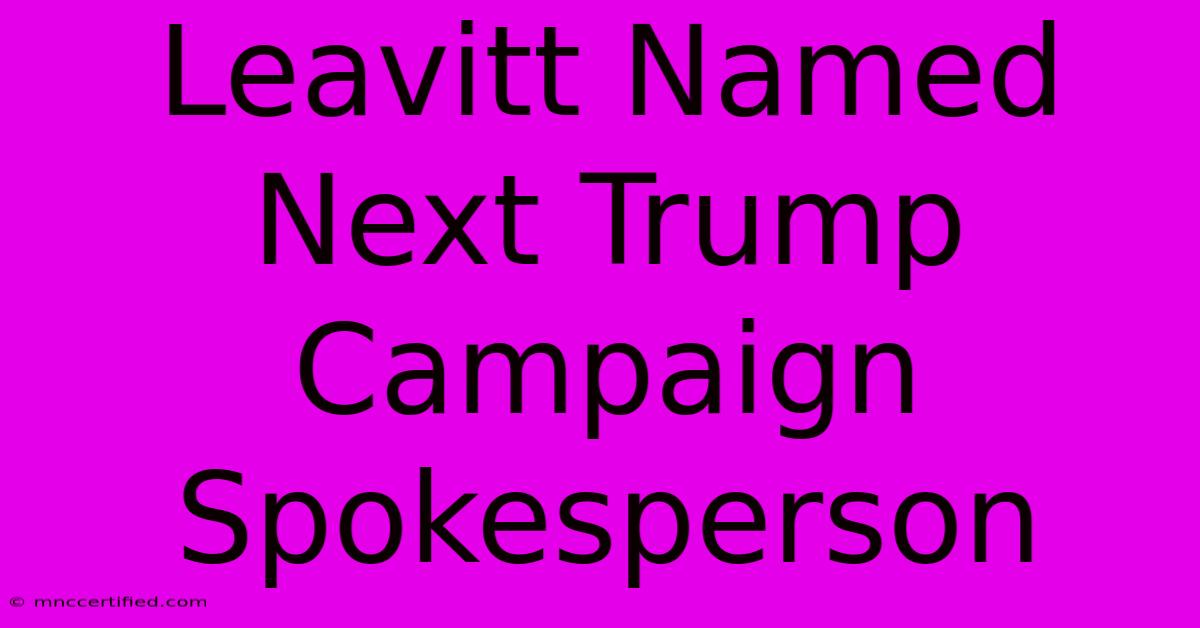Leavitt Named Next Trump Campaign Spokesperson

Table of Contents
Leavitt Named Next Trump Campaign Spokesperson: A Deep Dive into the Announcement
The bombshell dropped: Former Congressman Jason Leavitt has been named the next spokesperson for Donald Trump's 2024 presidential campaign. This announcement sent shockwaves through the political landscape, sparking intense debate and speculation across media outlets. This article delves into the implications of this appointment, examining Leavitt's background, potential strategies, and the broader context of the Trump campaign.
Who is Jason Leavitt? Understanding the New Spokesperson
Before analyzing the impact of this appointment, it's crucial to understand Leavitt's background. He's a figure known for his staunch conservatism and unwavering loyalty to Donald Trump. His past political roles, including his time in the House of Representatives, provide valuable insight into his likely approach as spokesperson. Understanding his political history is key to predicting the future direction of the Trump campaign's messaging.
Leavitt's Political Trajectory: A Closer Look
Leavitt's career has been characterized by a consistent focus on [mention specific policy areas Leavitt is known for, e.g., fiscal conservatism, anti-regulation stances]. This background suggests that the Trump campaign may prioritize these issues in its communication strategy going forward. It's essential to examine his voting record and public statements to gain a full understanding of his political leanings and potential communication style.
Analyzing Leavitt's Communication Style
Observers have described Leavitt's communication style as [describe Leavitt's communication style – e.g., "forceful," "direct," "concise," "combative"]. This style could significantly influence the tone and content of the Trump campaign's future pronouncements. Will he adopt a more aggressive, confrontational approach, or will he seek to present a more moderate image? This remains to be seen.
Implications for the Trump Campaign: Shifting Strategies and Messaging
Leavitt's appointment signals a potential shift in the Trump campaign's communication strategy. His selection suggests [analyze potential reasons for choosing Leavitt – e.g., a desire for a more disciplined messaging approach, a focus on specific demographics, or an attempt to appeal to a broader range of voters].
Targeting Specific Demographics: A Key Strategy
The choice of Leavitt may reflect a strategic effort to target [mention specific demographic groups the Trump campaign may be trying to reach]. His past experience and communication style might resonate particularly well with these groups. Analyzing this demographic targeting is crucial to understanding the overall campaign strategy.
Messaging and Tone: What to Expect
The appointment could lead to [predict potential changes in the campaign's messaging – e.g., a more focused message, a more aggressive tone, or an attempt to soften the image of the campaign]. Analyzing past campaign communications and comparing them to Leavitt's communication style can offer valuable predictions.
The Broader Political Context: National Reactions and Analyses
The appointment has sparked widespread reactions across the political spectrum. [Discuss reactions from different political parties and media outlets]. Analyzing these reactions provides crucial context for understanding the significance of Leavitt's appointment within the larger political landscape.
Media Coverage and Public Opinion: A Critical Assessment
The media's portrayal of Leavitt and its analysis of his appointment will significantly shape public perception. Analyzing the media coverage will provide valuable insights into the potential impact of this appointment on the upcoming election.
Potential Challenges and Opportunities
Leavitt's appointment presents both challenges and opportunities for the Trump campaign. He faces the challenge of [mention potential challenges – e.g., unifying a fractured party base, navigating media scrutiny, and effectively communicating the campaign's message]. However, he also has the opportunity to [mention potential opportunities – e.g., energize the base, appeal to undecided voters, and shape the narrative of the campaign].
Conclusion: Looking Ahead to the 2024 Election
Leavitt's appointment as Trump's spokesperson marks a significant moment in the 2024 presidential campaign. His background, communication style, and the broader political context will all play critical roles in shaping the campaign's trajectory. Only time will tell the full impact of this decision, but careful analysis of his past and the current political climate is essential to understanding the path ahead. Further developments in the campaign will undoubtedly shed more light on the effectiveness of this significant strategic move.

Thank you for visiting our website wich cover about Leavitt Named Next Trump Campaign Spokesperson. We hope the information provided has been useful to you. Feel free to contact us if you have any questions or need further assistance. See you next time and dont miss to bookmark.
Featured Posts
-
Does Insurance Pay For Urgent Care
Nov 17, 2024
-
Where To Watch Florida Vs Lsu Live
Nov 17, 2024
-
Jutta Leerdams Revealing Outfit At Event
Nov 17, 2024
-
Travis Hunter Penalty Heisman Trophy Game
Nov 17, 2024
-
England Rugby Final Score Vs South Africa
Nov 17, 2024